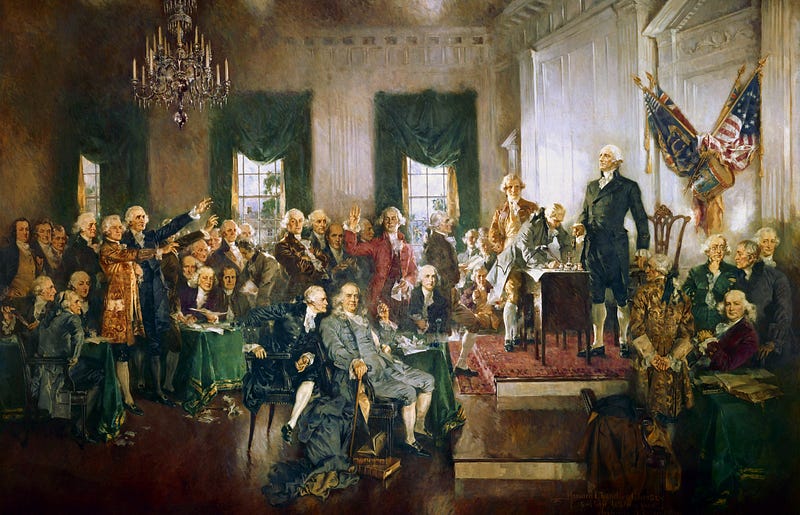A Discussion of Oliver DeMille’s 1913 Chapter 12 “Free Citizens Read the Fine Print”
If you are familiar with the U.S. government system at all, you know a key idea of the Founders is to use checks and balances to divide power.
The Senate contends with the House. Both together contend with the President. The states are supposed to be able to say no to the federal government. With all these layers of power, its overall design was for the people to be in charge of it all.
Oliver DeMille adds a new dimension to this understanding. (p. 150)
- The House represents the people, which includes the poor and less powerful.
- The Senate, as it was designed before the Seventeenth Amendment, represents the states. They also knew it would attract the interest of the wealthy.
- The president represents the whole nation.
- The courts are supposed to represent the Constitution.
- The states represent themselves and the people.
- The Constitution represents the people if they will read it and apply it.
- The electors of the Electoral College represent the people.
You will notice from that list that the people show up in multiple places.
In simple terms, the following were represented once: the wealthy and the nation. On the complex side, those which were naturally less powerful than the wealthy and national government were represented twice: the states and also the Constitution. The least naturally powerful group, the regular people, was represented in our constitutional model four times (by the House, the local and state governments, the document of the Constitution itself, and the power to oversee the entire system and change it. (p. 150)
A lot of the problems people complain about today are too much power in the hands of the federal government, the rich, and big business. However, as the system was designed that should not be the case.
The reason our problems have come about, DeMille observes, is that the people have to exercise their power or they will lose it.
Another simple reality is this: When people lose their freedoms in such a system, it is always the people, not the system, which have failed The people have all the power, but they must choose to exercise it. (p. 151)
Over the years, as the people have lost interest in civic affairs, they have lost the knowledge of their power — the powers they have been given by the Constitution.
What he says we need to do now is read the fine print — something we seldom do even in our daily lives. We sign complex mortgage documents, for example, largely based on trust that they are correct. That is something that could harm us directly so no, it is not surprising that we also won’t spend the time reading the latest bills in Congress.
DeMille notes that the Founders who fought for our freedom did not cease their efforts once they won. They created the fine print that is our Constitution and then taught their children to read bills, laws, debates, and court cases. (p. 155)
After the painful price they paid to establish a free nation — the many sacrifices of their families and lives — imagine their frustration that we won’t even read what the government is doing. Eventually, after their anger wore off, I think they would resign themselves to the following reality: Unless we start reading government documents again (from history and also from current events), we will lose our freedom. (p. 156)
DeMille notes the vital foundations of the Constitution have held up over the years despite our lack of attention although some recent events have weakened the Constitution.
One example he gives was the insurance mandate requirement of the Affordable Care Act, aka Obamacare. (p. 159) It was removed in 2017, but the fact it was put in place is potentially damaging to the Constitution that reserved the power to mandate citizen behavior to the states.
With this precedent set, it would be possible for a future Congress and President to require Americans to do or buy something with the ease of passing a bill.
Another example he gives is the 2012 National Defense Authorization Act that granted the military permission “to arrest and hold American citizens in indefinite incarceration without warrant, charges, or trial.” (p. 159)
Stopping terrorism is a noble goal, but maintaining our freedoms that are protected under the Constitution is even nobler. The years that followed show it was a bad idea, and it makes us into the kind of people we do not want to be.
We are not the first people to be lazy about defending our freedom. The 3 Turning Points of 1913 combined with the 1936 Butler decision passed without any outcry by the people of that time.
Societies where the regular people aren’t allowed to read or comment on the laws are totalitarian, authoritarian, or dictatorial. Societies where the regular people are allowed to read and comment on the government and laws but instead decide not to, leaving it mostly to others, end up losing their freedoms. Most end up adopting Aristocracy or Socialism. If we want to be free, we must read the fine print. (p. 161)
Then the conclusion is, we have a choice. We can keep going as we have and let Idiocracy be prophetic. Or, we have to be the people who will do the work.
Reference: DeMille, Oliver, 2012. “Free Citizens Read the Fine Print” Chapter 12 of 1913, Obstacles Press, Inc., Flint, Michigan.




